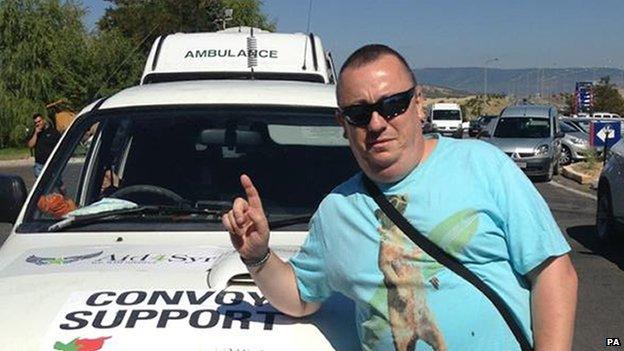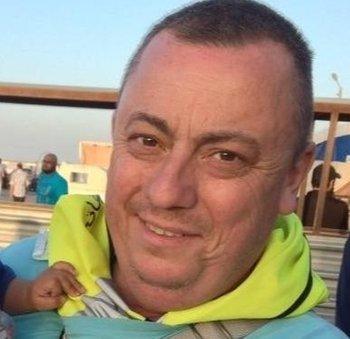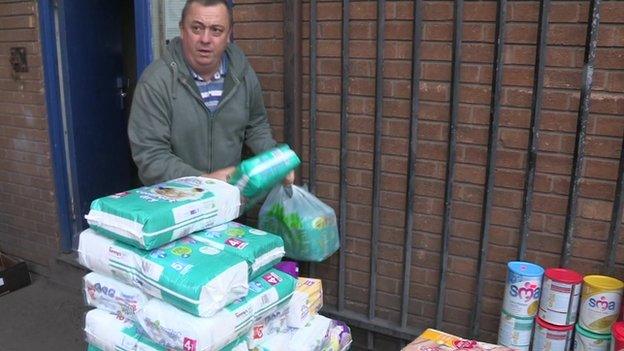British hostage Alan Henning's friends speak of anguish
- Published

Taxi driver Alan Henning was volunteering on an aid convoy
Friends of hostage Alan Henning have told of their anguish at his plight at the hands of Islamic State militants.
The 47-year-old from Eccles in Salford was a volunteer on an aid convoy in Syria when he was captured.
One friend said Eccles had been hit "hard" by the father-of-two's kidnapping and he was "disappointed" by the government's response.
Foreign Secretary Philip Hammond has said rescue options are limited as it is not known where he is being held.
Mr Hammond met foreign ministers, including US Secretary of State John Kerry, in Paris on Monday to discuss the international response to IS, which is also known as Isil and Isis, and controls large parts of northern Iraq and Syria.
He said if the UK and other nations knew where hostages were being held it would be a "different story".

IS has threatened to kill Mr Henning
A video showing the death of UK aid worker David Haines was released earlier this week, and his death followed that of two US hostages.
US air strikes have targeted IS militants in Iraq in recent weeks.
The UK has not been involved in the air strikes but has flown surveillance missions and donated heavy machine guns and ammunition to authorities in Iraq to help fight IS.
'A jolly person'
Mr Henning had worked as a taxi driver, and a fellow black cab driver from Eccles who has known him for 20 years described him as a "gentleman".
Roy, who did not want to give his surname, told BBC Radio 4's Today programme: "I'm finding it very hard to understand this. Very hard.
"He's a family man. He's got kids at home. He's well known around the area. It's only a small town... it hits everybody hard."
He added that Prime Minister David Cameron "could have done more and he could have done it earlier".
"He's known about this lad for a long time," added Roy. "I'm disappointed, the way the government has gone about it."

Mr Henning had previously visited a refugee camp in Syria
Fellow taxi driver Stuart Ryan said of Mr Henning, also known as Gadget: "He's the greatest man you'd ever meet. Gadget is the taxi driver of Eccles. Everybody knows him."
Dorothy O'Neill, who worked with Mr Henning at Swan Taxis in Salford, described him as "a jolly person and a nice person".
She questioned the government policy of not paying ransoms for hostages, saying she believed they should do so in this case.
"I wonder if David Cameron would be saying the same if it was one of his family who was over there," she added.
'Fearing every second'
Former Colombian politician Ingrid Betancourt, held as a hostage for six years, said those kidnapped by IS were facing a "nightmare".
Ms Betancourt, who was held by Farc rebels before her release in 2008, said IS hostages were being held by people "with no boundaries".
"I would say they must be fearing every second of their captivity," she told Today.
Speaking of her own time in captivity, which was under "completely different" circumstances, Ms Betancourt said one of the most difficult things was "the question mark on our lives - not knowing how long it would take us to get out of there and if we would be able to see our loved ones again."
'Incredible human beings'
She said it was obvious those held by IS were "under a lot of pressure" when they appeared in videos released by the militants.
"They know how the others have been killed," said Ms Betancourt. "I suppose for them it is just a nightmare."
She added: "They must be incredible human beings. When you see the record of their lives, you know these are men that have been choosing the hard life for their belief. They have been wanting to help others."
Ms Betancourt said she had been particularly moved by the words of Mr Haines' brother Mike, who said that while his first reaction could have been hatred, his brother's life "wasn't about hatred".
The general secretary of one charity, Altrincham-based Syria Relief, said it was "dangerous" for British people to go to Syria and they discouraged it.
Dr Ayman Jundi, emergency medicine consultant at the Royal Preston Hospital, said people on the ground in Syria were "in a much better position to take aid into Syria and deliver it where it is needed" as they had up-to-date intelligence about what is happening in the country.